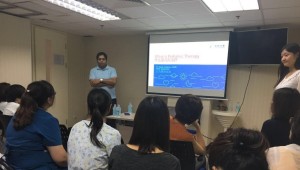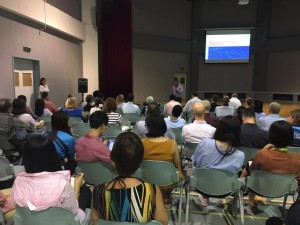Between July and September, LIH Olivia’s Place Beijing was invited to attend numerous events in the community to provide training and information for parents, teachers, and healthcare professionals.
Lectures on Child Development at Hongkong Clinic & BIBS
 On July 27, Milind Sonawane, Speech-Language Therapy Lead at LIH Olivia’s Place Beijing, offered a lecture to clinicians at Beijing’s Hongkong Clinic on the topic of Child Development and Pediatric Therapy. The event served as the foundation for further cooperation between LIH Healthcare and Hongkong Clinic in Beijing to continue the establishment of early screening and intervention treatment of child developmental disorders.
On July 27, Milind Sonawane, Speech-Language Therapy Lead at LIH Olivia’s Place Beijing, offered a lecture to clinicians at Beijing’s Hongkong Clinic on the topic of Child Development and Pediatric Therapy. The event served as the foundation for further cooperation between LIH Healthcare and Hongkong Clinic in Beijing to continue the establishment of early screening and intervention treatment of child developmental disorders.
Milind shared his professional knowledge and experience, and discussed the future direction of pediatric therapy with clinicians in attendance. First, he introduced the general pattern of child motor development. He also talked about early “red flags” that signal concern in a child’s motor development. Through case review, Milind explained how an interdisciplinary team ( for example, including physical therapy, occupational therapy, speech therapy, and psychology) consultation) conducts a comprehensive and subsequently provides therapy services through a treatment plan. Attendees asked a lot of questions and participated in active discussion, especially on topics like interdisciplinary evaluation, diagnosis, and treatment, as well as the various therapeutic models used across countries.
This event was a tremendous success. Through exchange of experience and knowledge, LIH Olivia’s Place supports clinicians to evaluation and treat child behavior and developmental concerns.
 On August 15, Mr. Sonawane lectured on child development for more than 70 teachers at Beanstalk International Bilingual School. He talked about children’s development at different stages, including the areas of gross motor, fine motor, social, cognition, and speech and language. He emphasized the significance of focusing on child development, as well as measures to take when there are “red flags” signaling concern. Teachers gained approaches to use as they identify potential problems with a student’s development.
On August 15, Mr. Sonawane lectured on child development for more than 70 teachers at Beanstalk International Bilingual School. He talked about children’s development at different stages, including the areas of gross motor, fine motor, social, cognition, and speech and language. He emphasized the significance of focusing on child development, as well as measures to take when there are “red flags” signaling concern. Teachers gained approaches to use as they identify potential problems with a student’s development.
Although each child develops at their own pace, it is possible to see what is within the range of “typical” and we look to “developmental milestones,” such as saying first words, crawling, walking, or even the age a child rides a bike the first time. When a one-year-old is not able to cruise by holding onto furniture or use a pincer grasp to pick up objects, or a three year old is lacks the basic skills to help put on clothes or climb stairs independently, these are examples of situations when early intervention may be greatly beneficial.
As an expert in speech and language, Milind also gave teachers advice on how to help children who have language delays. He explained that, when a child cannot understand your instructions or is having difficulty producing language, or cannot produce sound, it is necessary to consider the child’s ability to think, whether they have a solid language foundation in a specific language, their oral motor skills, their ability to hear and understand, and whether they need more time to answer questions. These observations will help a teacher to understand the child’s level of ability and whether to seek further assistance. Read more




